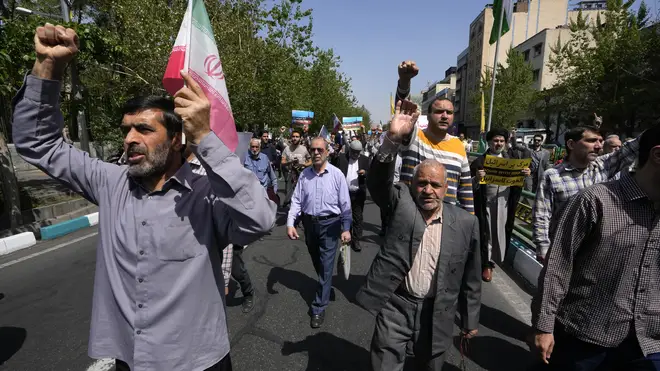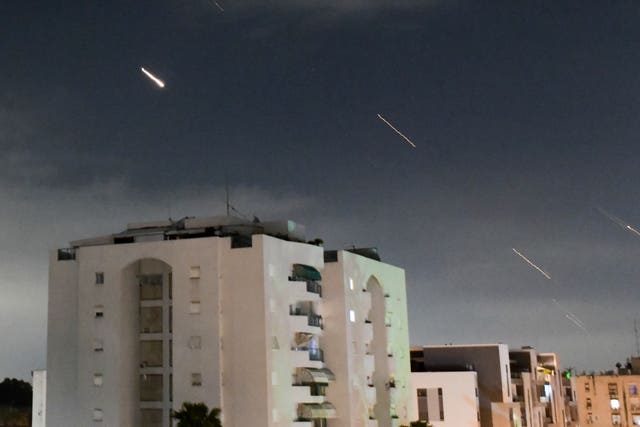
Nick Abbot 10pm - 1am
19 April 2024, 18:44

Tensions have risen since Hamas and Islamic Jihad, Iranian-backed Palestinian groups, attacked Israel on October 7.
Israel and Iran have played down an apparent Israeli air strike near a major air base and nuclear site in central Iran, signalling the two bitter enemies are ready to prevent their latest eruption of violence from escalating into a full-blown region-wide war.
But the indecisive outcome of weeks of tensions — which included an alleged Israeli strike that killed two Iranian generals, an unprecedented Iranian missile barrage on Israel and the apparent Israeli strike early on Friday in the heart of Iran — did little to resolve deeper grievances between the foes and left the door open to further fighting.
“It appears we’re closer than ever to a broad regional war, despite the fact that the international community will most likely make a great effort to de-escalate tensions,” wrote Amos Harel, the military-affairs commentator for the Israeli daily Haaretz.
Israel has long considered Iran to be its greatest enemy, citing the Islamic Republic’s calls for Israel’s destruction, its nuclear programme and its support for hostile proxies across the Middle East.
The tensions have risen since Hamas and Islamic Jihad, Iranian-backed Palestinian groups, attacked Israel on October 7, sparking a devastating Israeli offensive in Gaza that has continued for more than six months.
Hezbollah, an Iranian-backed proxy in Lebanon, immediately began striking Israeli targets, opening up tit-for-tat fighting along a second front, while Iranian-backed militias in Iraq, Syria and Yemen have also fired missiles and drones at Israel throughout the war.
While Israel and Iran have waged a shadow war for years, mostly in neighbouring Syria, they have largely avoided direct confrontations.
That changed after an April 1 air strike killed two Iranian generals at a diplomatic compound in the Syrian capital of Damascus. Although Israel did not comment, Tehran blamed Tel Aviv for the strike and vowed revenge.
Iran responded with its first direct attack on Israel, launching more than 300 missiles and attack drones late on Saturday night.

Israel, working with a US-led international coalition, said it intercepted 99% of the incoming fire, though a handful of missiles landed, causing minor damage to a military base and seriously wounding a young girl.
In Friday’s attack, Iranian state television said air defence batteries fired in several provinces amid reports of drones in the air. Army commander General Abdolrahim Mousavi said crews targeted several flying objects.
“The explosion this morning in the sky of Isfahan was related to the shooting of air defence systems at a suspicious object that did not cause any damage,” he said.
Authorities said air defences fired at a major air base near Isfahan, which long has been home to Iran’s fleet of American-made F-14 Tomcats — purchased before the 1979 Islamic Revolution.
Isfahan also is home to sites associated with Iran’s nuclear programme, including its underground Natanz enrichment site, which has been repeatedly targeted by suspected Israeli sabotage attacks.
The apparent attack on Friday came on Iranian Supreme Leader Ayatollah Ali Khamenei’s 85th birthday.
State television described all Iranian atomic sites in the areas as “fully safe”. The United Nations’ nuclear watchdog, the International Atomic Energy Agency, also said there was “no damage” to Iran’s nuclear sites.
Iranian officials made no mention of possible Israeli involvement. That could be intentional, particularly after Iranian officials for days threatened to respond to any Israeli retaliatory attack on the nation.
Israel also had no comment on the apparent attack.
But Italy’s foreign minister, Antonio Tajani, said at a summit of western leaders in Capri that the US had received “last-minute” information from Israel about the attack. US secretary of state Antony Blinken did not dispute that, but said: “We were not involved in any offensive operations.”
UN secretary-general Antonio Guterres called for an end to the strikes.
“It is high time to stop the dangerous cycle of retaliation in the Middle East,” his office said.